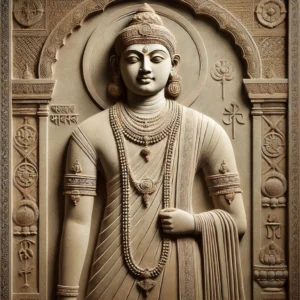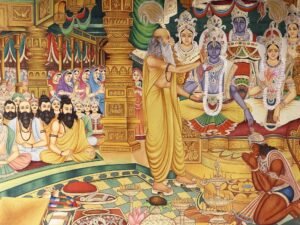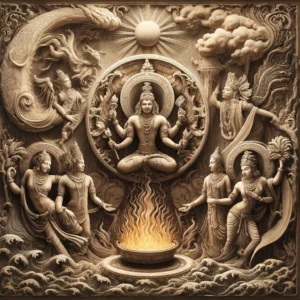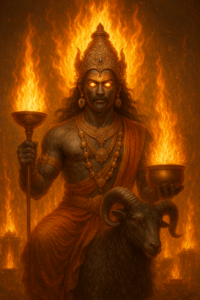
Introduction to Sanatan Dharma
In a world where diverse belief systems shape the fabric of societies, the open and secular nature of Sanatan Dharma, often referred to as Hinduism, shines as a beacon of pluralism and spiritual exploration. Unlike its Abrahamic counterparts, Sanatan Dharma places a strong emphasis on seeking truth through personal understanding and inquiry, fostering an environment where diverse perspectives and interpretations coexist harmoniously. Let’s explore how this ancient tradition embraces an open and secular approach that encourages individuals to embark on a journey of self-discovery and intellectual exploration.
Embracing the Pluralistic Path to Truth
At the heart of Sanatan Dharma lies a profound respect for the individual’s journey towards truth. Unlike Abrahamic religions, which often present a unified truth to be accepted on faith, Sanatan Dharma recognizes that truth is multifaceted and can be approached from various angles. This approach is rooted in the belief that each person’s experiences and insights contribute to a collective understanding of reality. From the Vedas to the Upanishads, the emphasis is on seeking truth rather than passively accepting it.
Openness to Inquiry and Philosophical Exploration
One of the defining characteristics of Sanatan Dharma is its unwavering commitment to intellectual inquiry and philosophical exploration. Rather than discouraging questioning or dissent, the tradition actively encourages individuals to engage in debates, discussions, and introspection. This openness is exemplified by the wide range of philosophical schools and viewpoints that have emerged over centuries. Schools like Advaita Vedanta, Vishishtadvaita, and Dvaita present different perspectives on the nature of reality, consciousness, and the divine, creating a rich tapestry of thought.
Secularism and Diversity
Sanatan Dharma’s secular nature is embedded in its very essence. The tradition embraces diversity in thought, practice, and belief, making it a remarkably inclusive way of life. The concept of “Dharma” emphasizes righteousness, duty, and ethical conduct, and it is not confined to religious dogma. Whether one is a devotee, a philosopher, or an agnostic, the pursuit of Dharma is open to all. This openness is beautifully captured in the words of the Rigveda: “Let noble thoughts come to us from every side.”
Absence of Central Authority
Unlike many organized religions, Sanatan Dharma lacks a centralized authority or a single hierarchical structure. This decentralization empowers individuals to forge their own spiritual paths without the need for intermediaries. Gurus, spiritual leaders, and philosophers are seen as guides rather than arbiters of truth. This absence of a central authority nurtures a culture of self-discovery and personal connection with the divine.
Spiritual Practices and Self-Realization

Sanatan Dharma offers a myriad of spiritual practices that cater to diverse temperaments and inclinations. From meditation (dhyana) to selfless service (seva), from devotion (bhakti) to knowledge (jnana), individuals are encouraged to choose the path that resonates with them the most. This personalized approach emphasizes the importance of self-realization and understanding over blind adherence.
Exploring Truth: Contrasting Approaches in Dharmic and Abrahamic Religions”
1. Approach to Truth:
- Dharmic Religions (e.g., Hinduism, Buddhism, Jainism, Sikhism): These religions emphasize personal exploration and understanding of truth. They encourage seekers to engage in self-inquiry, meditation, and contemplation to uncover truths about existence and the nature of reality. There is a recognition that truth may be multifaceted and that individuals can have varying perspectives based on their personal experiences and insights.
- Abrahamic Religions (e.g., Judaism, Christianity, Islam): These religions tend to present their sacred texts (Bible, Quran, Torah) as containing definitive truths revealed by a higher power. The emphasis is often placed on accepting these truths through faith and adhering to prescribed beliefs and practices. While there might be discussions and interpretations within the religious community, there is a stronger emphasis on a singular, revealed truth.
2. Belief and Faith:
- Dharmic Religions: These religions generally allow for a wider range of beliefs and interpretations. Followers are encouraged to seek their own paths to spiritual understanding, and there is often room for diversity in beliefs and practices within the same tradition.
- Abrahamic Religions: These religions tend to place a higher emphasis on orthodoxy, wherein adherents are expected to adhere to specific doctrines and beliefs outlined in their respective scriptures. The emphasis is on accepting certain core truths and teachings as non-negotiable aspects of faith.
3. Spiritual Authority:
- Dharmic Religions: Spiritual authority in Dharmic traditions often comes from personal experience, self-realization, and direct connection to the divine. Gurus, monks, and spiritual leaders are often seen as guides rather than intermediaries between individuals and the divine.
- Abrahamic Religions: Spiritual authority in Abrahamic traditions is often vested in religious leaders, clergy, and scholars who interpret and teach the scriptures. These leaders play a role in guiding believers and providing insights into the meaning of sacred texts.
4. Openness to Inquiry:
- Dharmic Religions: These religions generally encourage open inquiry, debate, and philosophical exploration. Seeking truth is often seen as a lifelong journey, and different schools of thought coexist within the same tradition.
- Abrahamic Religions: While there is room for interpretation and discussion, there can be a greater tendency to discourage questioning core tenets of faith or engaging in critical analysis of sacred texts.
Modern Relevance of an Ancient Tradition
In an era marked by globalization, multiculturalism, and interconnectedness, the open and secular nature of Sanatan Dharma holds immense relevance. It stands as a testament to the possibility of fostering coexistence amidst diversity. As societies grapple with issues of intolerance and rigid dogma, the values upheld by Sanatan Dharma provide a valuable alternative—a way of seeking meaning while respecting individuality.
Conclusion
Sanatan Dharma’s open and secular nature has nurtured a vibrant tradition that celebrates the unity of all beings while recognizing the uniqueness of each individual’s spiritual journey. This approach to truth-seeking, inquiry, and diverse beliefs showcases the beauty of pluralism and the power of self-discovery. As we navigate the complexities of our world, the principles of Sanatan Dharma continue to inspire us to embrace open-mindedness, engage in thoughtful exploration, and foster a spirit of unity in diversity.





